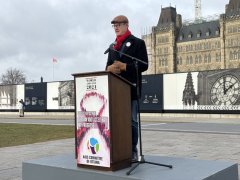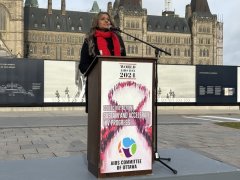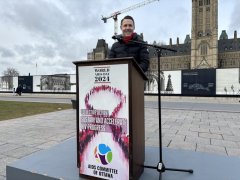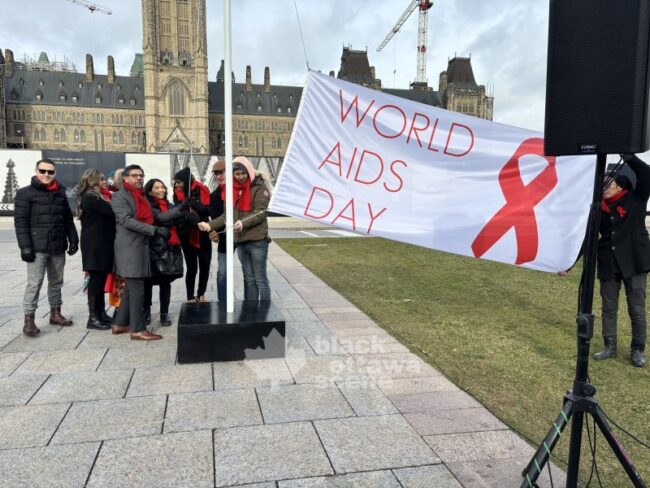
World AIDS Day 2024: AIDS Committee of Ottawa calls for an end to HIV Stigma
Friday 29 November 2024
By Ijeoma Ukazu, Editorial Associate
Despite the chilly weather on Friday morning, the 29th of November, the AIDS Committee of Ottawa (ACO) and some members of the community gathered ahead of Sunday’s World AIDS Day with the aim to raise more awareness and call for an end to HIV stigma in Canada.
The event, which took place in the heart of Parliament Hill, with many attendees adorned with red mufflers, a symbol of the celebration. People from all walks of life gathered with their faces reflecting a mix of determination and compassion. Among them were healthcare workers, activists, families, and individuals living with HIV, all united by a common goal: to break the chains of stigma that had long surrounded the disease.

It’s estimated that 39 million people are living with HIV globally, including about 65,000 in Canada. An estimated six new diagnoses are made each day in this country, which has resulted in an estimated 15-per-cent increase in the number of individuals living with HIV since 2020.
This year’s theme—“Take“the Rights”Path”—served as a reminder of advocates’ key message: that inequalities and human rights need to be front of mind when tackling the HIV epidemic.
Fundamentally, HIV is a chronic disease that is manageable. “But understanding and addressing stigma in communities, particularly racism and its material consequences, is crucial to eradicating HIV from our communities,” said Canada’s Chief Public Health Officer, Dr. Theresa Tam.
According to Dr. Tam, individuals experiencing health and social inequalities are disproportionately at risk of contracting HIV, as evidenced by a recent report by Public Health Agency of Canada. This recent surge in HIV cases has resulted in a reversal of global and national efforts to end the decades-long epidemic by 2030.
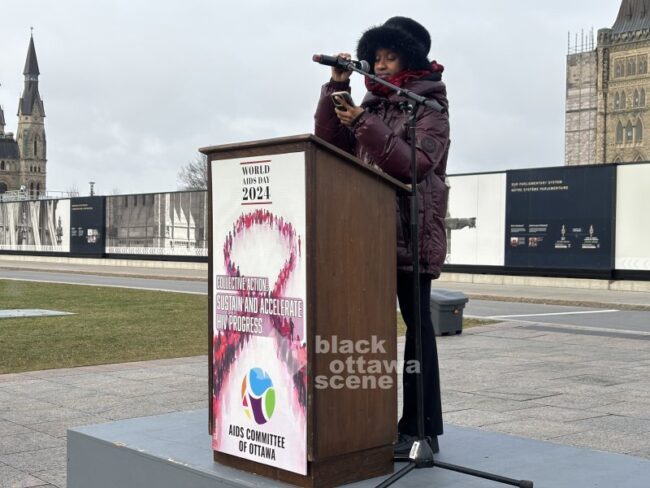
“Stigma fuels HIV, which has led to mental health issues and societal exclusion,” said Billa Hissen Habre, a community member.
According to Hissein, “Racism reinforces HIV stigma, and HIV stigma reinforces racism, creating a vicious cycle of discrimination and disadvantage.”
Habre’s words resonated deeply with the audience, as she explained that stigma can impact an individual’s ability to seek support and care, highlighting the damaging effects of HIV stigma, including depression, anxiety, job loss, housing discrimination, and societal exclusion.
She emphasized the need for everyone to challenge and eliminate stigma in order to improve the lives of those living with HIV and those vulnerable to it.
Tharani Napper, Director, Government Affairs and Market Access for ViiV Healthcare, a British multinational pharmaceutical company specializing in the research and development of medicines to treat and prevent HIV/AIDS, reflected on the past achievements in mobilizing the public sector and government in partnership in ending the HIV epidemic and advocating for people living with HIV.
She said more action is needed to reach national and global targets to end the epidemic within five years – a longstanding goal.
Patrick O’Brien, a nurse practitioner with Ottawa Public Health, highlighted the advancements in HIV testing, diagnostics, and treatment, which include the introduction of self-testing and long-acting treatments. Yet, despite this progress, there are ongoing challenges of stigma and the disproportionate impact on certain communities, including Indigenous, African, Caribbean, and Black Canadians.
O’Brien emphasized the importance of increasing access to testing and treatment to reduce new infections and improve health outcomes.
Member of Provincial Parliament of Ontario, Joel Harden, highlighted the importance of addressing the criminalization of HIV and the need for evidence-based policies to support people living with HIV, while he emphasized the role of organizations like the AIDS Committee Ottawa, in providing hope and support to the community.
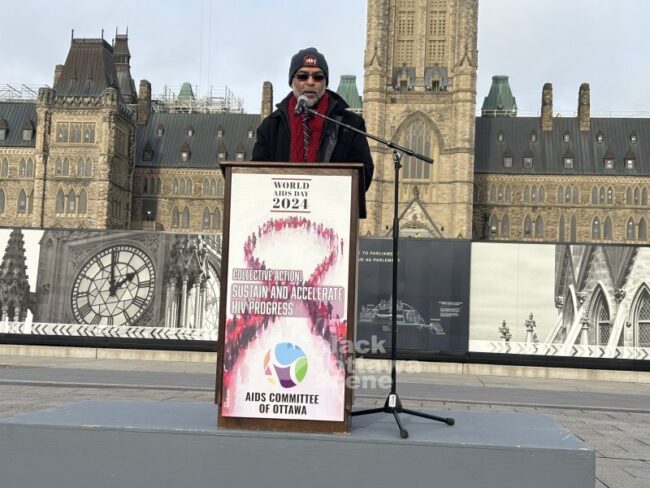
The Executive Director at ACO, Khaled Salam, was strong and clear about ending stigma, as he addressed the crowd, adding that there is a need for continued efforts to reduce stigma and improve access to care and treatment for people living with HIV.
According to Salam, World AIDS Day also marks the start of Indigenous AIDS Awareness Week. “It is about raising awareness when it comes to HIV/AIDS and sexual health in the indigenous populations. That’s why we included drumming, as it’s an integral part of their culture”.
One of the most poignant moments of the event was a recital of the names of those who died of HIV/AIDS and were denied a proper burial. The National Art Centre hosted the recitation as the ceremony transitioned into its second phase. “The community uses the AIDS quilt to honour those who died of AIDS in the 1980s without HIV treatments. People were dying soon after diagnosis, and the stigma associated with HIV/AIDS prevented them from receiving a proper burial,” according to Khaled.
Khaled highlighted the importance of community mobilization, partnerships, and systemic solutions to combat HIV and HIV stigma in Canada, as well as the need for continued education, compassion, and intentional efforts to create a more equitable society.
The amazing performances at the reception were the highlight of the event, showcasing and highlighting Ottawa’s drag community.
The crowd erupted in applause from outstanding performances; their spirits lifted by the day’s events. As everyone dispersed into the night, the message was clear: the fight against HIV stigma was far from over, but with unity and determination, a brighter, more inclusive future was within reach.







